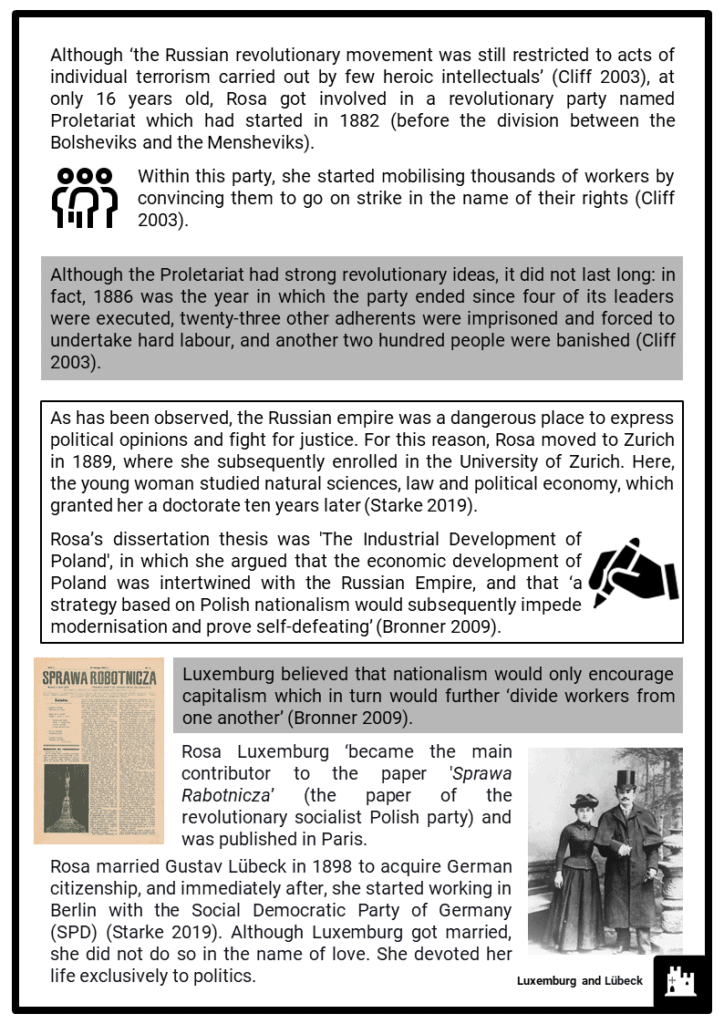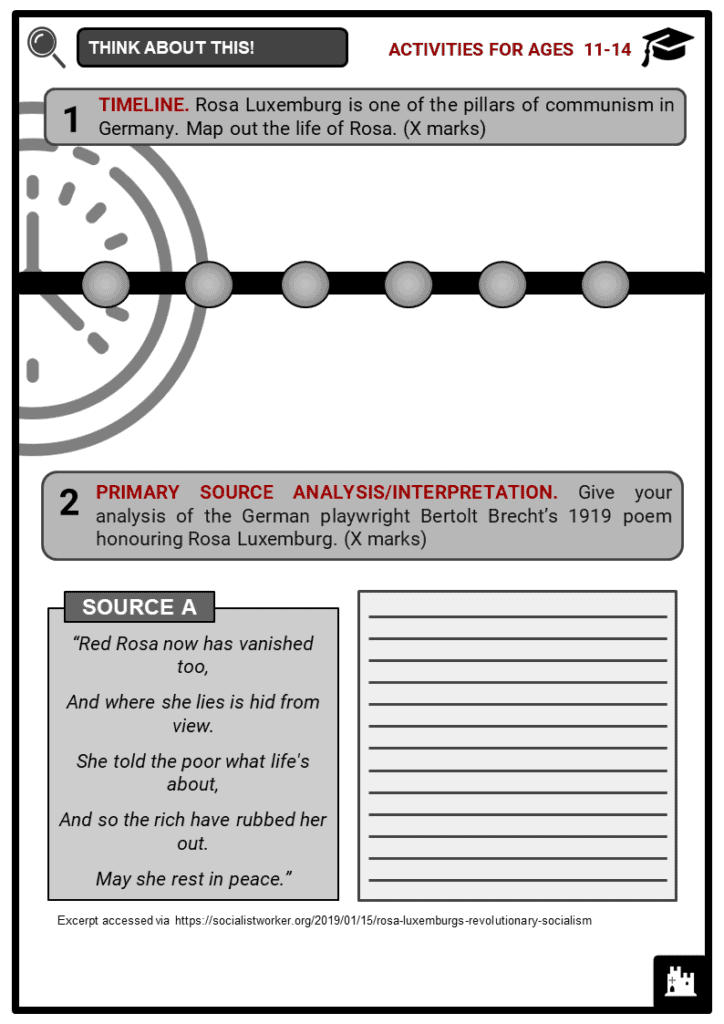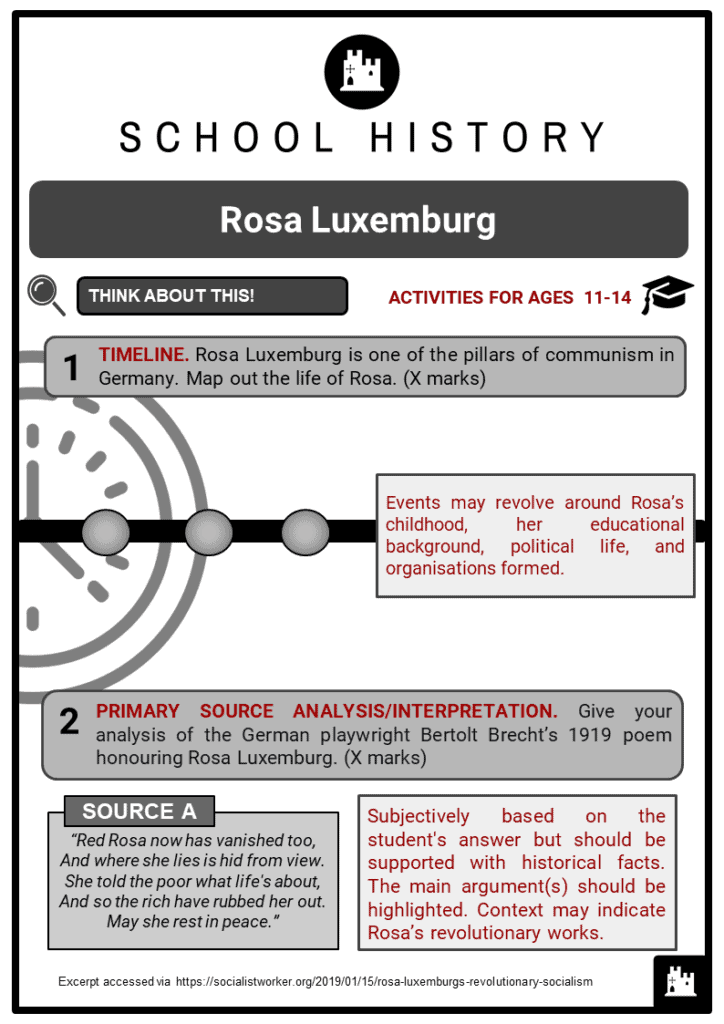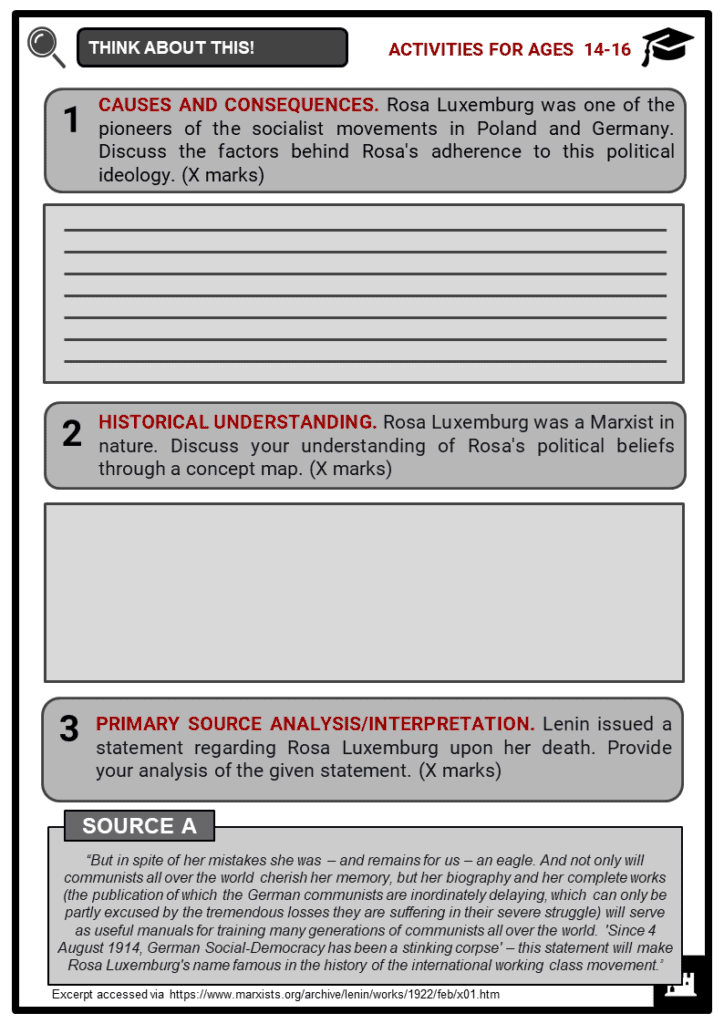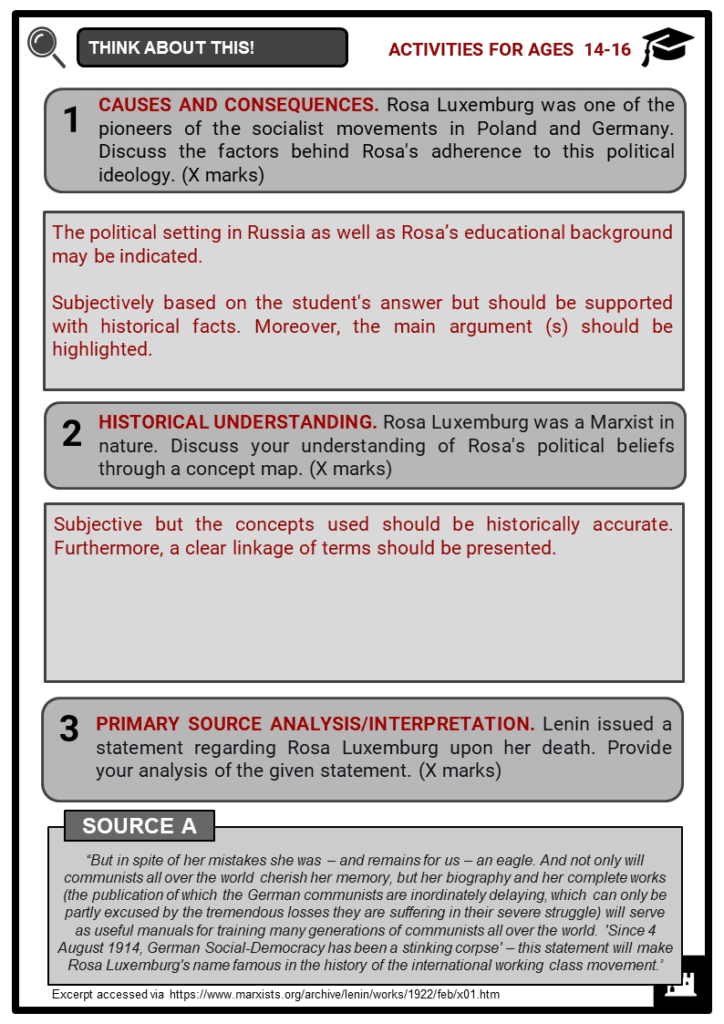Download Rosa Luxemburg Worksheets
Do you want to save dozens of hours in time? Get your evenings and weekends back? Be able to teach Rosa Luxemburg to your students?
Our worksheet bundle includes a fact file and printable worksheets and student activities. Perfect for both the classroom and homeschooling!
Table of Contents
Add a header to begin generating the table of contents
Summary
- The personal background of Rosa Luxemburg
- Rosa Luxemburg as a revolutionary
- The impact of Rosa Luxemburg in the socialist movement
Key Facts And Information
Let’s find out more about Rosa Luxemburg!
- Rosa Luxemburg dedicated her life to politics. She was a revolutionary Marxist socialist theoretician and a leader of the German communists between 1918-1919. Although she was a cripple, and barely five feet tall, her personality was fiery and energetic. Furthermore, she embraced the “scientific socialist” doctrines (Le Blanc 1999).
Biography
- Rosa Luxemburg was born on 5 March 1871 at Zamość, in Poland (which was part of the Russian Empire), and died on 15 January 1919 in Berlin.
- Her family was Jewish, belonged to the lower-middle class, and Rosa had four siblings.
- She received a classical education: she attended the gymnasium, and she started taking part in ‘underground [political] activities’ as soon as she arrived at high school (Starke 2019).
- Although ‘the Russian revolutionary movement was still restricted to acts of individual terrorism carried out by few heroic intellectuals’ (Cliff 2003), at only 16 years old, Rosa got involved in a revolutionary party named Proletariat which had started in 1882 (before the division between the Bolsheviks and the Mensheviks).
- Within this party, she started mobilising thousands of workers by convincing them to go on strike in the name of their rights (Cliff 2003).
- Although the Proletariat had strong revolutionary ideas, it did not last long: in fact, 1886 was the year in which the party ended since four of its leaders were executed, twenty-three other adherents were imprisoned and forced to undertake hard labour, and another two hundred people were banished (Cliff 2003).
- As has been observed, the Russian empire was a dangerous place to express political opinions and fight for justice. For this reason, Rosa moved to Zurich in 1889, where she subsequently enrolled in the University of Zurich. Here, the young woman studied natural sciences, law and political economy, which granted her a doctorate ten years later (Starke 2019).
- Rosa’s dissertation thesis was 'The Industrial Development of Poland', in which she argued that the economic development of Poland was intertwined with the Russian Empire, and that ‘a strategy based on Polish nationalism would subsequently impede modernisation and prove self-defeating’ (Bronner 2009).
- Luxemburg believed that nationalism would only encourage capitalism which in turn would further ‘divide workers from one another’ (Bronner 2009).
- Rosa Luxemburg ‘became the main contributor to the paper 'Sprawa Rabotnicza’ (the paper of the revolutionary socialist Polish party) and was published in Paris.
- Rosa married Gustav Lübeck in 1898 to acquire German citizenship, and immediately after, she started working in Berlin with the Social Democratic Party of Germany (SPD) (Starke 2019). Although Luxemburg got married, she did not do so in the name of love. She devoted her life exclusively to politics.
- Whilst living in Switzerland, she met Leo Jogiches (also a young socialist), who she exchanged love letters with over the years. The dynamics of their relationship are not well known; however, according to their correspondence, it appears that the two entertained ‘a stormy relationship with intense highs and lows: for instance, when Luxemburg entered an affair with another man, Jogiches threatened to kill her by showing up with a gun’ (Scott 2011).
- Despite this incident, Luxemburg maintained her relationship with Jogiches, and according to historians ‘there was no longer a trace of discord between them’ (Scott 2011; citing Nettl 1966).
- If one reads Rosa Luxemburg’s last letters, one can notice that she is genuinely worried that he had been arrested (Scott 2011). This demonstrates that despite the situation they had faced within their relationship, Rosa ‘maintained a comradely working relationship as a political equal with him’ (Le Blanc 1999).
- In 1903, Rosa Luxemburg disagreed with Lenin in regards to the manner in which the political party should be structured, as well as on the ‘relation between the party and the activity of the masses’ (Cliff 2003). Since she indulged in ‘insulting the Kaiser’, Luxemburg was sentenced to three months in prison (yet, she served only one month) (Cliff 2003).
- Luxemburg had precise ideas of what socialism means and believed that if it was to ‘transform workers from “dead machines” into the “free and independent directors” of society as a whole, they must have the chance to learn and exercise their knowledge’ (Bronner 2009; citing Luxemburg).
- In essence, she did not support the idea of ‘experts’ or ‘leaders’ governing a party and encouraging the workers’, nor ‘blind obedience’ since that would create an ulterior division between ‘the leadership and the base’ (Bronner 2009). According to this idea, everyone should have a role in the government of a party.
- In 1905 Luxemburg took part in the Russian Revolution. During this period, she wrote many articles and pamphlets for the Polish party and introduced the idea of ‘permanent revolution’ (Cliff 2003). In fact, ‘while both the Mensheviks and Bolsheviks, despite the deep division between them, believed that the
- Russian Revolution was to be a bourgeois-democratic one, Rosa argued that it would develop beyond the stage of bourgeois democracy and would either end in workers’ power or complete defeat. Her slogan was “revolutionary dictatorship of the proletariat based on the peasantry” (Cliff 2003).
- Although the peak of the Russian Revolution had passed, meetings between group/workers were forbidden, as was the publishing of papers. However, Rosa Luxemburg’s party papers and contributions were still being printed clandestinely. For this reason, she was arrested for four months and was released only because of her poor health and because she was German (Cliff 2003). Upon her return to Germany in 1906, she was imprisoned for advocating the general strike.
- At the beginning of World War I in 1914, Rosa incited German soldiers to mutiny and made accusations of brutality against German officers. In fact, in a speech addressed to the soldiers, she claimed “If they expect us to murder our French or other foreign brothers, then let us tell them, ‘No, under no circumstances’’ (Cliff 2003), and in court, she ‘turned from defendant into prosecutor’ (this speech is published as Militarism, War, and the Working Class’ (Cliff 2003). For this reason, she was imprisoned at Breslau. Despite having being sentenced for just one year, Rosa was held in protective custody until the end of the war.
- Once released, she helped Karl Liebknecht organise the communist Spartacus League and edit the paper Rote Fahne (meaning ‘Red Flag’) which, during the revolution that followed the German military collapse, united the German proletariat to revolution, and the seizure of power.
- During a street fight on 15 January 1919, which Rosa and Liebknecht had instigated and led, both were taken prisoners and Liebknecht was murdered.
- On 8 November 1918, during the German Revolution, Rosa welcomed ‘with all her energy and enthusiasm’ the spirit of the revolution (Cliff 2003). However, opposition and reactions were strong. Amongst the thousands of workers that were killed was Rosa Luxemburg. She had been shot. Her body was thrown into a canal but was removed for burial a few days later.
- Throughout her life, Rosa Luxemburg was the author of several books and pamphlets, including The Accumulation of Capital (published under the title Die Akkumulation des Kapitals) (1913), and The Crisis in the German Social Democracy (1916) – which was first published under the pseudonym of Junius.
- The Accumulation of Capital (1913) examines what connections exist between capitalism, nationalism, militarism and imperialism (Bronner 2009). However, she also contributed and edited many socialist journals and papers, and gave a number of inspiring speeches.
Personality
- The book The Letters of Rosa Luxemburg (2011) gives a clear picture of the personality that lies behind such a revolutionary and fearless woman.
- Although Luxemburg always refused to focus on her gender, she was undeniably a very strong woman that was able to express her ideology and personality in a predominant male milieu. In some sense, she believed that the emancipation of women would be a result of political changes. In fact, in 1902, she wrote “with the political emancipation of women a strong fresh wind must also blow into [the socialist movement’s] political and spiritual life, dispelling the suffocating atmosphere of the present philistine family life which so unmistakably rubs off on our party members too, the workers as well as the leaders” (Le Blanc 1999; citing Luxemburg 1902).
- According to Dunayevjkaya, Luxemburg’s main necessity was that of being ‘free [and] independent’ (Le Blanc 1999; citing Dunayevjkaya). After all, her great intellectual development occurred after she split with Jogiches, and as Luxemburg stated, “the character of a woman shows itself not where love begins, but rather where it ends” (Bronner 1993).
- Overall, Luxemburg remains to this day one of the most inspiring women of the 20th century: she managed to overcome gender boundaries within the ‘inner circles of the German, Polish and Russian left-wing workers’ (Le Blanc 1999). Moreover, she was a brilliant intellectual: she was a ‘political analyst, a pioneering economic theorist, a fine writer an inspiring teacher, a powerful speaker, and a revolutionary leader who displayed both courage and insight’ (Le Blanc 1999).
- As Cliff (2003) claims, ‘in her life, as in her death, she gave everything for the liberation of humanity’.


